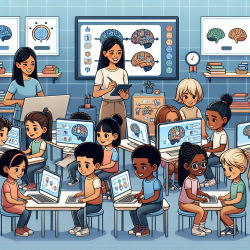Introduction
As practitioners dedicated to enhancing the communication skills of children, it is crucial to leverage evidence-based approaches that can significantly impact their development. A recent study titled "Main Concept, Sequencing, and Story Grammar Analyses of Cinderella Narratives in a Large Sample of Persons with Aphasia" offers valuable insights into the efficacy of narrative analysis in speech therapy. This research not only highlights the differences in narrative abilities between individuals with aphasia and those without but also provides a robust framework for assessing and improving discourse skills in children. In this blog, we will explore how practitioners can implement the findings of this study to enhance their therapeutic interventions and encourage further research in this area.
Understanding the Main Concept, Sequencing, and Story Grammar (MSSG) Approach
The MSSG approach is a comprehensive analytic method that combines Main Concept Analysis, Sequencing, and Story Grammar to assess narrative abilities. This study examined the Cinderella narratives of a large sample of individuals with aphasia and compared them to those without brain injuries. The results revealed significant differences in all MSSG variables, demonstrating the clinical usefulness of this approach in identifying discourse deficits.
Implementing MSSG in Speech Therapy for Children
Practitioners can harness the power of the MSSG approach to improve narrative skills in children with communication disorders. Here are some practical steps to implement this approach:
- Main Concept Analysis: Focus on identifying and scoring the essential elements or "main concepts" in children's narratives. Encourage them to convey complete and accurate information by using structured prompts and visual aids.
- Sequencing: Teach children to organize their narratives logically by practicing story sequencing activities. Use visual storyboards or digital tools to help them arrange story elements in the correct order.
- Story Grammar: Emphasize the importance of story grammar elements such as setting, initiating events, and consequences. Engage children in storytelling exercises that require them to include these components in their narratives.
Encouraging Further Research
While the MSSG approach has shown promise, further research is needed to explore its full potential in different populations and settings. Practitioners are encouraged to collaborate with researchers to investigate the following areas:
- Adapting the MSSG approach for use with younger children and those with different types of communication disorders.
- Exploring the impact of cultural and linguistic diversity on narrative abilities and the effectiveness of the MSSG approach.
- Developing digital tools and resources to facilitate the implementation of the MSSG approach in various therapeutic settings.
Conclusion
The Main Concept, Sequencing, and Story Grammar (MSSG) approach offers a data-driven framework for assessing and improving narrative skills in children with communication disorders. By implementing this approach in speech therapy, practitioners can empower children to become more effective communicators. Moreover, continued research in this area will further enhance our understanding of narrative abilities and lead to more effective interventions. To read the original research paper, please follow this link: Main Concept, Sequencing, and Story Grammar Analyses of Cinderella Narratives in a Large Sample of Persons with Aphasia.










